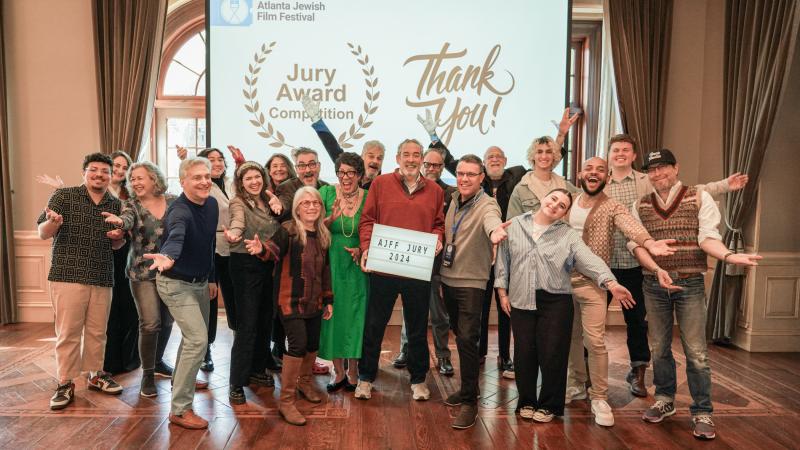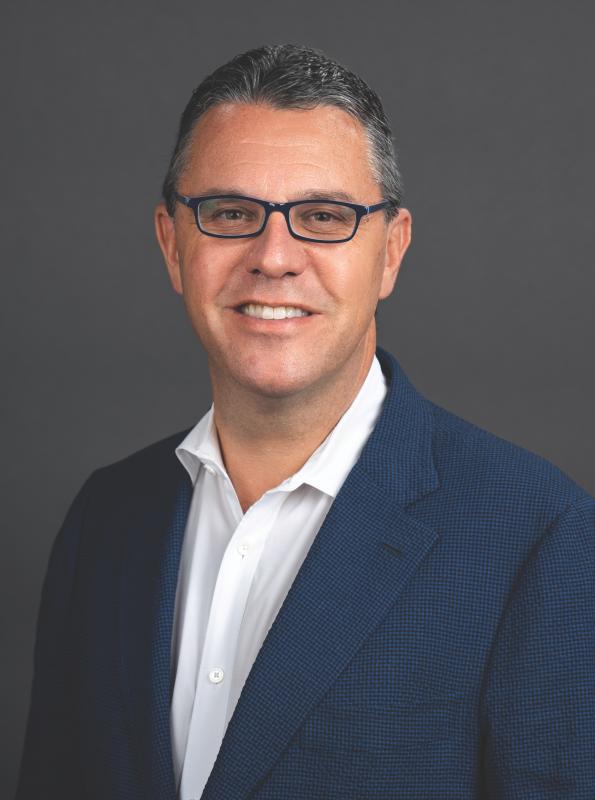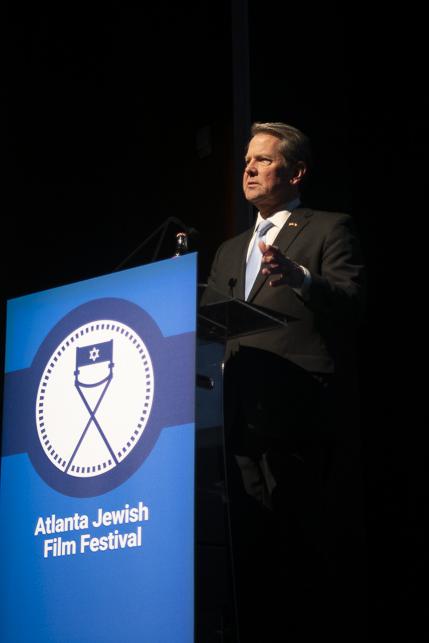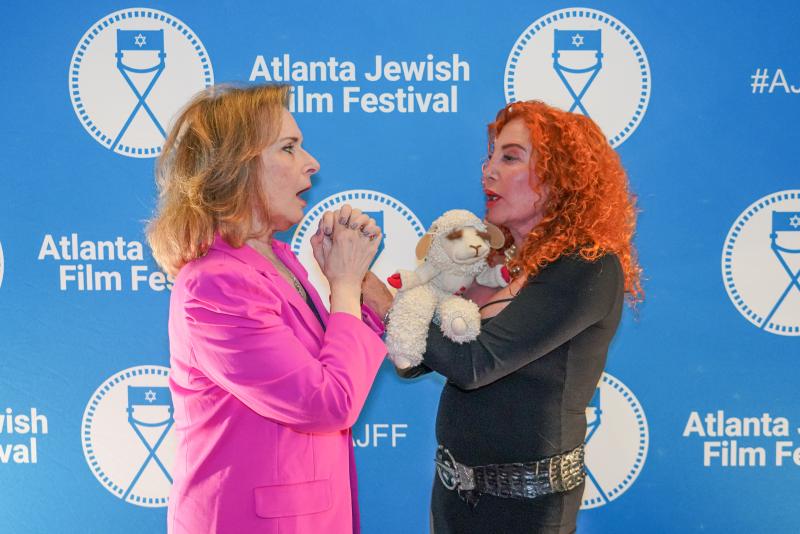Grant Spotlight: Atlanta Jewish Film Festival

Jury deliberations at the 2024 Atlanta Jewish Film Festival. Photo by Eric Burkard
In 2000, the Atlanta Jewish Film Festival (AJFF) originated as an advocacy project of the Atlanta, Georgia chapter of the American Jewish Committee (AJC), aiming to utilize film as a tool to advance the AJC's mission of bridge-building, combatting intolerance, and advocating for Jewish rights. In 2014, the AJFF evolved into an independent arts and cultural organization, while maintaining their partnership with the AJC and remaining steadfast in their commitment to use film as a catalyst for understanding and dialogue among diverse communities.
In January 2024, AJFF received an Arts Endowment grant to support the work of their annual film festival, a showcase of independent and international films that delve into themes of identity, history, and culture. Each film screening features a personalized live introduction, and many also include a post-film Q&A session, providing the audience with an opportunity to connect with the filmmakers and other special guest speakers. Kenny Blank, executive and artistic director of AJFF, explained that the “post-film Q&A is a cornerstone of what makes attending a film festival a unique experience, far beyond just another movie screening.”
“At AJFF, we take it a step further by often including not just filmmakers but also topical experts—academics, community leaders, authors, journalists—who can provide additional context and insights. This blend of perspectives enriches the conversation, making it more engaging and educational for the audience,” said Blank.
We spoke with Blank about the importance of film in bridging communities, the creative process for the annual film festival, and the vision for the organization as they approach their 25th anniversary.

Kenny Blank. Photo by the Arthur M. Blank Family Foundation
NEA: Why do you think film is an effective vehicle for breaking down cultural barriers?
KENNY BLANK: There’s something uniquely compelling about film—it's perhaps the most accessible art form out there. Think about it. You walk into a movie theater and suddenly you're in what I like to call the ultimate safe space. It's a place where people from all walks of life come together for a shared experience. And it's this experience that makes film so effective at breaking down barriers.
At AJFF, we leverage this power by curating a diverse array of stories that touch on universal themes—humanity, history, culture, heritage. These aren't just films; they're invitations to see the world through someone else's eyes, to step out of our comfort zones. They challenge us, unite us, and help us confront complex social issues and historical truths. And after the lights come up, we keep the conversation going with discussions and events that encourage dialogue and deepen the connections formed in the dark of the theater. It's this combination of shared experiences and thoughtful engagement that helps us find our common humanity, bridging divides and fostering understanding across cultures.
NEA: What makes AJFF unique compared to other film festivals?
BLANK: What really sets AJFF apart is our commitment to not just being a film festival serving the Jewish community, but a cultural celebration that welcomes everyone. It’s written into our DNA—our mission, our strategic plan, our values emphasize reaching beyond just our core Jewish audience to include all communities. This isn’t just a festival; it’s a vibrant, inclusive celebration where anyone can find value and feel connected, no matter their background.
We also truly embody the spirit of Atlanta. AJFF takes on the flavor, character, and richness of our city. It’s a festival that’s built by the community for the community. We have hundreds of dedicated volunteers from every sector—business, the film industry, arts, culture, marketing and media, religious groups, and more. All these people come together to shape AJFF, making it a grassroots effort that reflects the diversity and strength of Atlanta itself.
We also engage deeply with Atlanta's institutions to bring their expertise into our fold, creating partnerships that enhance what we offer and how we present it. This community-centric approach not only enriches the festival experience but also ensures that AJFF remains a significant cultural event tailored to the unique tapestry that is Atlanta.
NEA: What is the selection process for the films screened at the annual festivals?
BLANK: The film selection process at the Atlanta Jewish Film Festival is incredibly rigorous and inclusive. Each year, we look at 500 to 600 films, which come to us through an open call for entries as well as through proactive research by our programming team, which digs through other festival lineups across the globe to find films that might fit our criteria. Once we've gathered all these films, our selection committee comprised of volunteers from diverse backgrounds, gets to work. These aren't just film buffs; they're people from all walks of life—different religions, cultures, professions—bringing a wealth of perspectives to the table. They meticulously evaluate each film, discussing and debating its merits, from its relevance to our mission to its artistic quality. This often sparks fascinating debates about what makes a film “Jewish.” Sometimes, the connection is not explicit; it's more about the underlying themes or narratives that resonate with Jewish experiences and values.
Our ultimate goal, which I as the executive and artistic director keep in focus, is to curate a well-rounded program. I consider a variety of factors: the film's pedigree, the reputation of the filmmakers, critical reception, marketability, and its potential to reach and impact diverse audiences. We aim to present a diversity of topics and genres that offer something for everyone.

Governor Brian Kemp giving remarks at the opening night of the 2024 Atlanta Jewish Festival. Photo by Eric Burkard
NEA: Considering the festival's focus on the Jewish experience, can you discuss how AJFF ensures representation and authenticity in the portrayal of Jewish culture and heritage in the selected films?
BLANK: On the topic of representation, here too again the diversity of perspectives brought by our selection committee volunteers is truly invaluable. They play a crucial role in ensuring films are thoughtfully vetted, particularly when it comes to sensitive topics surrounding representation and authenticity. For films that are more challenging or provocative, we also draw on community resources such as the expertise of our founder, the American Jewish Committee, and various academic institutions and cultural leaders. This layered approach allows us to maintain a high standard of authenticity and integrity in how Jewish culture and heritage are portrayed, ensuring our audience experiences a genuine and respectful representation.
NEA: Can you provide a snapshot of what the 2024 festival entailed? What were the goals?
BLANK: This year’s festival was all about finding the right balance between in-theater presentations and online streaming. Our primary goal was to refine our approach post-pandemic, focusing on delivering a hybrid festival that catered to both traditional cinema-goers and streaming audiences.
We kicked off with exclusive in-theater screenings, emphasizing the unparalleled experience of communal viewing. There's a unique thrill in watching a film in a theater—the sound, the scale, the shared reactions of the audience. It’s an immersive experience that films are inherently designed for, especially those that gain significant impact from the big screen setting.
Following the theatrical presentations, we opened a limited streaming window. This was crucial not only for reaching those unable to attend in person due to geographic, mobility, or other constraints but also for accommodating viewers' evolving preferences for accessing content on their own terms.
The decision to separate these experiences rather than run them concurrently meant each could be enjoyed to its fullest without compromising the other. This hybrid format, combining the best of both worlds, has helped us maintain inclusivity and continue our educational outreach efforts, enriching the festival experience and ensuring it remains accessible and engaging for all.
NEA: Could you highlight a film from the festival that made a significant impact on audience members?
BLANK: One film that deeply resonated during the 24th annual festival was Paper Clips, a remarkable documentary, celebrating its 20th film anniversary, that recounts a Tennessee school project where students from a predominantly Christian community collected paper clips to represent the millions of Jews who perished in the Holocaust. This initiative culminated in a poignant tribute to the victims, helping students understand the vast scale of the Holocaust.
The screening of Paper Clips at AJFF was extraordinarily special as it was presented as a field trip for hundreds of high school students from diverse backgrounds. It reunited key figures from the original project—the school's principal, filmmaker Joe Fab, and a former student now teaching history at the same school, continuing this impactful educational legacy. Joe Fab, who was battling cancer, made a significant effort to attend. Sadly, he passed away just two weeks after the festival, adding a layer of poignancy to the screening and making it an exceptionally memorable and emotional experience for all involved.
NEA: What are the ways in which AJFF measures success?
BLANK: AJFF is deeply embedded in our community, so a big part of how we measure success is by really listening to our audience and other stakeholders. This feedback loop is vital throughout the planning stages and even more so during our post-festival debriefs. We're not just about putting on a show; we aim to create a festival experience that resonates on multiple levels and truly serves the needs of our community.
To gauge how we're doing, we look at a variety of indicators. Ticket sales and attendance numbers give us a good snapshot of the festival's reach and impact. But we also dive deeper, exploring how well the event fosters educational and community engagement. We conduct audience surveys, run focus groups, and have thorough discussions with our committees and board of directors to gather a broad spectrum of feedback.
And it's not just about collecting data; it's what we do with it that counts. We always hold these insights up against our strategic goals and mission objectives. This helps ensure that every aspect of the festival—from the film lineup to the overall experience—aligns with our commitment to fostering cultural understanding and empathy. It’s about ensuring we're meeting the broader needs of those we serve. This ongoing dialogue with our community is crucial for us as we plan for the future and strive to keep improving year after year.

Lois Reitzes (left), Lamb Chop (center), and Shari Lewis (right) at the closing night of the 2024 Atlanta Jewish Festival. Photo by Eric Burkard
NEA: What do you hope people took away from attending the festival? What impact do you hope the festival had on the filmmakers?
BLANK: From the audience perspective, I hope they leave the festival inspired, perhaps with a changed worldview or new insights into different cultures. We aim for our films to spark conversation, to educate, and to challenge. Whether it's a story that touches on shared humanity or one that delves into the complexities of identity and history, our goal is for each attendee to find something that resonates personally and encourages them to think deeply about how we relate to one another. We want our audiences, no matter their background, to come away realizing that we have so much to learn from each other.
For filmmakers, AJFF is a premier showcase that brings their work to new and diverse audiences, some of whom might never have encountered their films otherwise. We are committed to maintaining the highest standards of presentation and exhibition, ensuring that every film is not only shown but celebrated in an environment that respects and elevates the filmmaker's vision. Watching their creations with an audience, witnessing firsthand the reactions and engaging in meaningful discussions, provides filmmakers with invaluable feedback. It's deeply satisfying for them to see the impact of their work—to know it matters and resonates.
NEA: What are the other ways in which the festival engages with the community?
BLANK: Our engagement with the community extends far beyond the festival itself. It’s woven through various initiatives that enrich and uplift the local area. A key component is our Community Engagement Committee, which drives our efforts to forge authentic partnerships and orchestrate programs that resonate beyond the Jewish community.
Education is a cornerstone of our outreach, collaborating with both public and private schools to leverage film as a dynamic educational tool. This approach not only brings films into classrooms but also sparks discussions on cultural and historical perspectives, enhancing cultural literacy.
Georgia's role as a hub for film and television enriches AJFF through strong collaborations with the local film industry. Industry professionals contribute by serving on our board of directors and volunteer committees, while film studios and other industry partners provide essential financial support. Additionally, these professionals lend their creative talents to enhance our marketing and the overall presentation of the festival, elevating the experience to reflect the highest standards of cinematic excellence.
We are also actively partnering with key Atlanta arts organizations in music, theater, dance, and opera. These partnerships aim to celebrate cinematic arts by creating
interdisciplinary collaborations. This reinforces AJFF’s role as a pivotal player in Atlanta’s broader arts and cultural community, enhancing our festival’s impact and reach.
NEA: What is your vision for the 25th anniversary of AJFF?
BLANK: As we approach our 25th anniversary, we're not just celebrating past successes; we're actively shaping a dynamic and inclusive future. Our goal is to transform AJFF into a year-round film forum, offering diverse programs that engaging audiences throughout the year in a variety of ways. Education and community engagement are central to this vision. We're expanding our educational initiatives, investing in our professional team to deepen connections with schools and community groups, and fostering a culture of learning that extends beyond the festival.
We're also enhancing our marketing to boost brand visibility and clarify our vision, creating strategic partnerships to elevate our presence in Atlanta and beyond. Accessibility remains a cornerstone of our efforts, aligned with our strategic plan to make all programming accessible and affordable. This includes selecting suitable venues that accommodate differently-abled individuals, ensuring accessible viewing options, and maintaining affordable ticket prices. As we move toward this milestone, we're committed to using film as a catalyst for cultural enrichment and change, aiming to significantly impact Atlanta's cultural scene and beyond.




